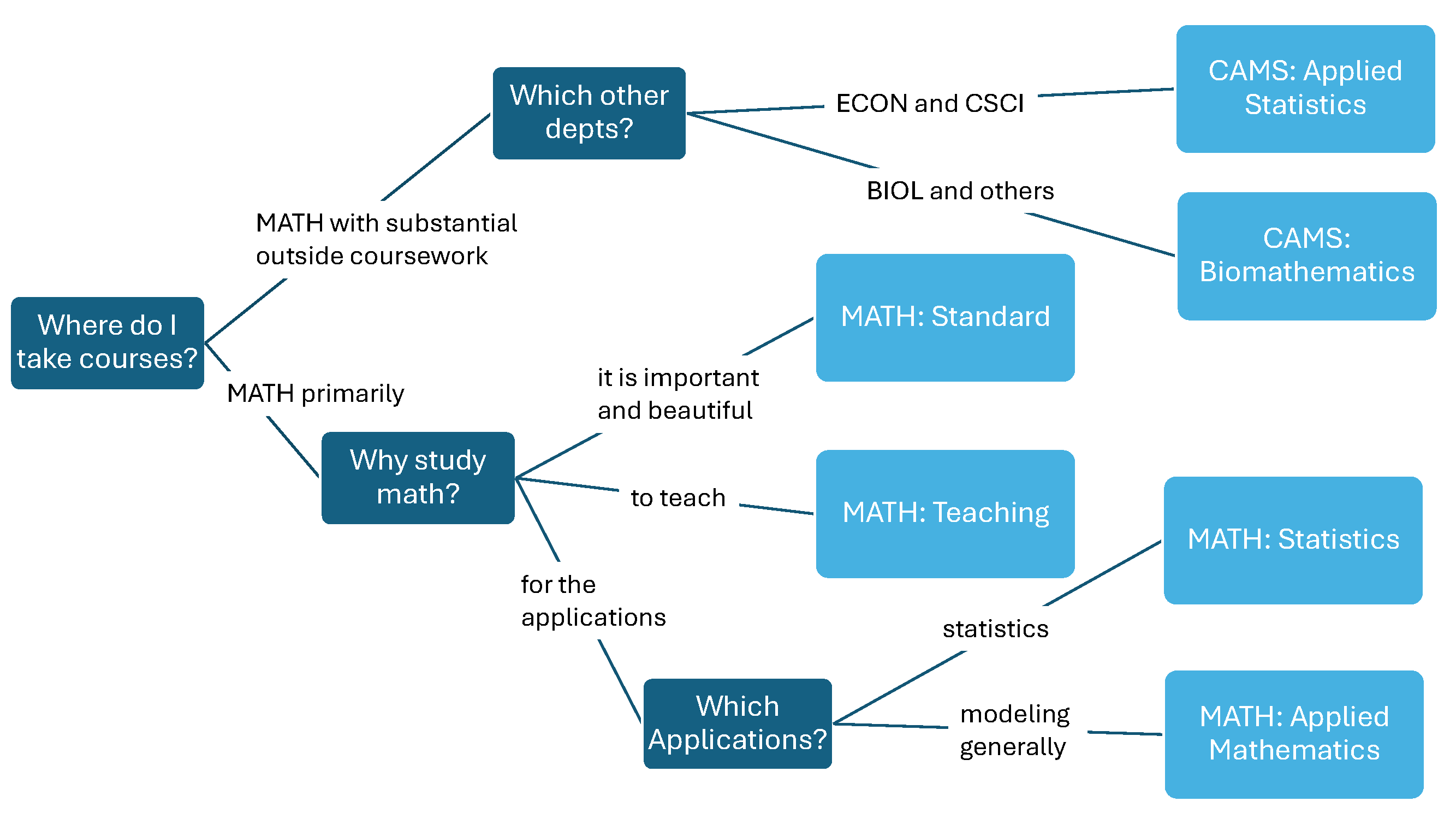Majoring in Mathematics
The mathematics program at William & Mary allows you to design a major based on your own interests and career goals. You will be prepared for employment and for further study of mathematical sciences and related disciplines.
The Mathematics Department offers four concentrations within the major:
- Standard Concentration
- Applied Mathematics Concentration
- Pre-College Mathematics Teaching Concentration
- Statistics Concentration
Each of the concentrations has specific requirements. All Mathematics majors must demonstrate proficiency in calculus, linear algebra, multivariable calculus, computer programming, and writing.
The core courses required by each concentration include Calculus I and II, Linear Algebra, Multivariable Calculus and Foundation of Mathematics. It is also required for all Mathematics majors to take both or one of Abstract Algebra and Elementary Analysis, and Statistics and Pre-College Mathematics Teaching concentrations have other specific required courses. Mathematics majors can take additional elective courses to complete at least 7-8 advanced mathematics courses. Mathematics majors are encouraged to do research projects supervised by faculty mentors during their studies, and they can complete an Honors Thesis for their research projects.
The following table compares the different requirements for the four concentrations.
|
|
||||
|
Computing |
CSCI141 |
CSCI141,241 |
CSCI141,241 |
CSCI141 |
|
Required Advanced |
Math 307 and 311 |
Math 307 or 311 |
Math307 or 311, and 451,452 |
Math302,307,316, 323,351,412, and EDUC301,310 |
|
Elective |
4 or 5 |
5 or 6 |
3 or 4 |
0 or 1 |
|
Total # of Advanced |
7 or 8 |
7 or 8 |
7 or 8 |
8 or 9 (inc. EDUC courses) |
|
Total # of Credits |
46-49 |
48-52 |
48-52 |
48-52 |

Regardless of the concentration you choose, you can further specialize your major. Specialization options include applied and pure mathematics, operations research, and statistics. You should discuss these various options with your advisor and map out a course of studies that will meet your objectives.
Sample four-year class plan for Mathematics majors (some courses are optional)
|
Fall |
Spring |
|
YEAR 1 MATH 111/131 CSCI 140/141 |
YEAR 1 MATH 112/132 CSCI 241 |
|
YEAR 2 MATH 211 MATH 212/213 |
YEAR 2 MATH 214 MATH 3XX (Elective) |
|
YEAR 3 MATH 311/311H MATH 3XX or 4XX (Elective) |
YEAR 3 MATH 307/307H MATH 3XX or 4XX (Elective) |
|
YEAR 4 MATH 3XX or 4XX (Elective) MATH 3XX or 4XX (Elective) MATH 495 |
YEAR 4 MATH 3XX or 4XX (Elective) MATH 3XX or 4XX (Elective) MATH 400 or MATH 496 |
About the Computer Proficiency Requirement
Computers are vital to your success as a mathematician. In addition to the obvious practical value, significant intellectual interactions have developed between computing and mathematics at the theoretic level. All mathematics majors are expected to be proficient in computer programming at the level of CSCI 141, but that course is only an introduction to computing. If you wish to apply mathematics in your career, you will need considerable programming experience, which is best gained through formal computer science training.
We recommend that all majors in mathematics
- Be proficient in one or more programming languages such as Java, C, or C++.
- Have the ability to use major mathematical software packages such as Matlab, R, Maple or Mathematica.
- Be familiar with technical word processors such as TeX or LaTeX.
- Have some experience with different computer operating systems such as Windows and Unix.
Major Advising
Many professors and teaching professors in Mathematics Department serve as undergraduate major advisors, and normally students choose one of them. Your initial choice of advisor is easy to change later. You can also ask the Chief Major Adviser to recommend you to an adviser based on your preference of concentration.
Once you have decided to major in mathematics, the next steps are to see one of the Mathematics Department's major advisors and complete the Declaration of Major Form [pdf].
You will review the course options, the requirements for the major, your progress toward meeting the College's general education requirements, your interests, and your long-range plans with your advisor. Together, you will work out a plan of studies to complete requirements for mathematics major. This plan is provisional and is easily changed - we know that your interests and plans might shift as you get deeper into your studies.
 Skip to main content
Skip to main content
